Captain Corelli's Mandolin Book Summary
Set during the early years of World War II, Dr. Iannis and his beautiful daughter Pelagia live on the Greek island of Cephalonia. Dr. Iannis is proud of the island's history but is angry with the incessant conquests from outsiders. Pelagia becomes engaged to Mandras, a poor fisherman obsessed with Pelagia because of her beauty. Dr. Iannis knows Pelagia doesn't truly love Mandras and refuses to give him a dowry, hoping to deter their marriage. Mandras leaves the island to fight against the invading Italian forces on the mainland. Pelagia sends him letters, but they remain unanswered.
One day, Mandras comes home disheveled, malnourished, and wounded. Pelagia finds Mandras's mother, Drosoula, and the two nurse him back to health. While caring for her fiancé, Pelagia makes two important discoveries: she wants to study medicine and heal people like her father, and she no longer loves Mandras. Once he is healed, Mandras leaves again. He calls to tell Pelagia he has decided to join a partisan communist organization called ELAS.
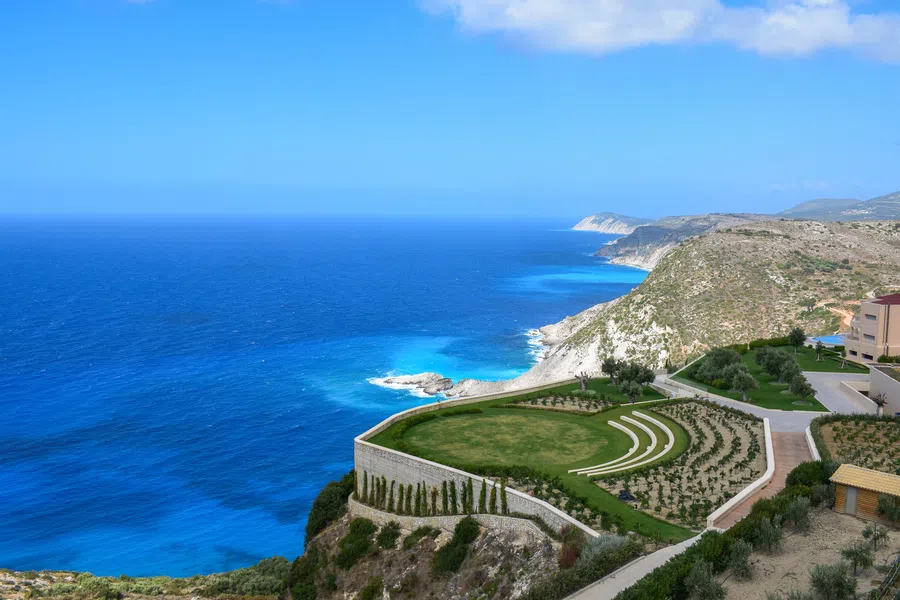
Fig. 1: The novel is set on the Greek island of Cephalonia.
Meanwhile, Italian forces led by Captain Antonio Corelli seize control of the island. Corelli is a talented musician, and his instrument of choice is his prized mandolin. He starts an opera group with some of his men, including Carlo Piero Guercio, a gay soldier who has recently lost the man he was in love with in the war.
While the Italian forces occupy the island, Dr. Iannis agrees to house Corelli if the Italians give the islanders medical supplies. The Italians agree. Corelli plays his mandolin for his hosts, wishing to thank them for their hospitality. But Dr. Iannis and Pelagia resent Corelli for the Italian occupation of their island and do everything in their power to make him feel bad about his involvement in the war.
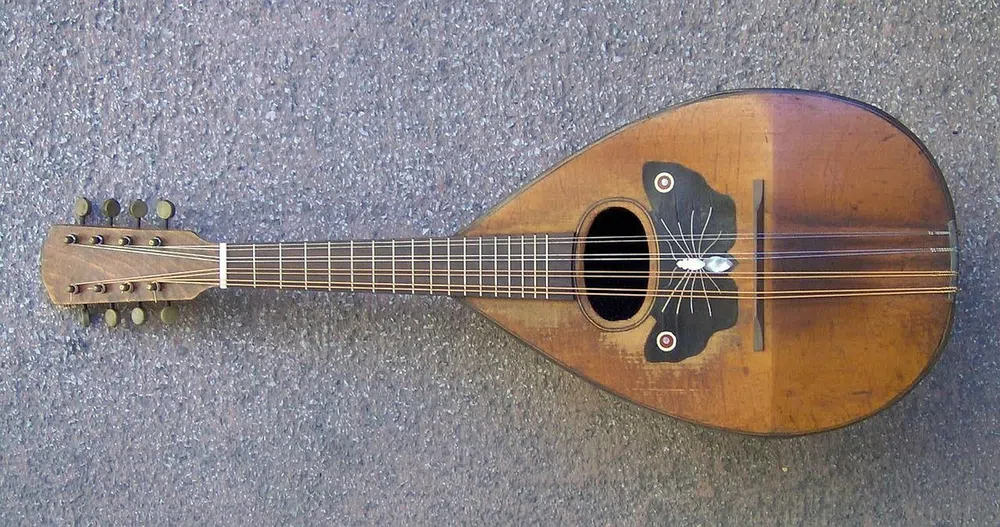
Fig. 2: Corelli and Pelagia develop feelings for one another when he plays her music on his mandolin.
Despite her resentment and weariness, Pelagia begins to fall in love with Corelli. They reveal their deepest secrets to one another: Corelli wants to be a musician, and Pelagia wants to become a respected doctor. Finally, feeling understood and connected, their romance blossoms. They kiss, take motorcycle rides together, and plan their future.
Everything is brought to a halt when Mussolini falls out of power, and the Germans turn on the Italians, who were once their allies. The German forces land on the island, and after a violent struggle, they round up and execute all the Italians in Cephalonia. Corelli is saved when Carlo, who has fallen in love with the captain, jumps in front of the bullet meant for Corelli. Corelli is badly wounded but alive when he is found and taken to Dr. Iannis and Pelagia. They perform surgery to save his life, but Corelli knows the situation is dire as an Italian. He vows to return to Pelagia after the war, leaving behind his mandolin and fleeing the country.
Benito Mussolini was the prime minister of Italy from 1922-1943. A journalist-turned-fascist-dictator, Mussolini played a central role in Italy's involvement in World War II. He entered an alliance with Hitler known as the Pact of Steel in 1939. The treaty was supposed to expire in 1949, but it ended with Mussolini losing power in 1943.
After Sicily was invaded in July 1943, Mussolini was overthrown, and his fascist government was replaced. Pietro Badoglio became the new Prime Minister of Italy and signed an armistice with the Allied forces in September. Italy declared war on Germany, its foremost ally, a month after signing the armistice with the Allied forces.
The German forces leave the island, and communist Greek forces take over. Dr. Iannis and other members of the bourgeoisie are sent to a concentration camp. Mandras, who has climbed the ranks in ELAS, is one of the new communist leaders. He knows Pelagia does not love him and attempts to rape her as punishment. Pelagia shoots Mandras in self-defense, and Drosoula disowns him. The wound is non-fatal, but he is so ashamed he drowns himself.
In Marxist theory, the bourgeoisie are the rich, capitalist class that exploits the poor. Because Dr. Iannis is wealthy, he and his friends are targets.
Pelagia and Drosoula move in together and adopt an abandoned baby, who Pelagia names Antonia. Dr. Iannis returns from the concentration camp completely changed and later dies saving Pelagia in a massive earthquake. Despite his promise, Corelli never returns, and Pelagia grows old waiting for him. Antonia eventually has a son, named Iannis in honor of the doctor. Iannis falls in love with music, and Pelagia gives him Corelli's mandolin.

Fig. 3: Pelagia continues practicing medicine after her father's death, despite rumors that she is a witch.
Years in the future, an old man comes to the island. He reveals himself as Corelli, and he has become a famous musician. Pelagia is furious when she discovers Corelli returned to the island years before, but upon seeing her with Antonia assumed Pelagia was married and fled. Eventually, the two make up, and at the novel's end, they ride off on a motorcycle as they did when they were young.
Captain Corelli's Mandolin Characters
Below are the main characters in the novel, including the star-crossed lovers, family members, friends, and antagonists.
Pelagia
The central protagonist of the novel, Pelagia is a beautiful young woman who decides she wants to practice medicine. She is somewhat of an outcast because of her intellect and ambition. Pelagia is first engaged to Mandras but falls in love with Captain Corelli after realizing she doesn't love Mandras. Pelagia is strong-willed and dedicated. She adopts an abandoned baby and raises her without a man, never remarrying after Corelli leaves.
Captain Antonio Corelli
A charismatic and sensitive Italian army officer, Captain Antonio Corelli meets Pelagia when he is ordered to seize Cephalonia. Despite being a good soldier, Corelli wishes the war was over and Europe could know peace. He would rather be a musician than an officer, and loves his mandolin. He and Pelagia unwittingly fall in love.
Dr. Iannis
Pelagia's father and the island's physician, Dr. Iannis is perhaps the most perceptive character in the novel. He supports his daughter and encourages her growth, even at the expense of societal expectations. He teaches her about love, humanity, empathy, and medicine. Dr. Iannis is thrown into a concentration camp when the communists take over, and the insightful doctor does not speak when he returns home two years later.
Mandras
Pelagia's fiancé at the beginning of the novel, Mandras is a poor and rash fisherman. He feels a constant desire to prove himself, joining both the war efforts and the communists in an attempt to do just that. He returns to Cephalonia after the German occupation an angry and powerful man. He wants to punish Pelagia for falling out of love with him and tries to sexually assault her.
Drosoula
Mandras's mother, Drosoula disowns her son when she discovers what he tried to do to Pelagia. Drosoula helps Pelagia raise the abandoned baby.
Antonia
Antonia is abandoned as a baby and raised by Drosoula and Pelagia. Pelagia raises her daughter to be freethinking and politically aware instead of demure and ladylike. Antonia becomes a communist and marries a radical lawyer. They name their son Iannis after Dr. Iannis.
Antonia was named after Corelli's mandolin.
Iannis
Antonia's only child, Iannis becomes a passionate musician, and his instrument of choice is the mandolin. He is named after his adoptive grandfather and spends the majority of his time with Pelagia because his parents are preoccupied with their business ventures.
Carlo Piero Guercio
A homosexual Italian soldier, Carlo saves Corelli from certain death at the hands of a German firing squad.
What is the significance of having a gay soldier? What does Carlo's character add to the novel?
Captain Corelli's Mandolin Genre
Captain Corelli's Mandolin is a work of historical fiction and a romance novel. Being a historical fiction novel, the story is based on true events, but the characters are fictional. Members of the Italian army had occupied parts of Greece—including Cephalonia—since Greece fell to Fascist Italian and Nazi German forces in the spring of 1941. Italy controlled most of the country until Mussolini fell out of power, and the Italians switched alliances.
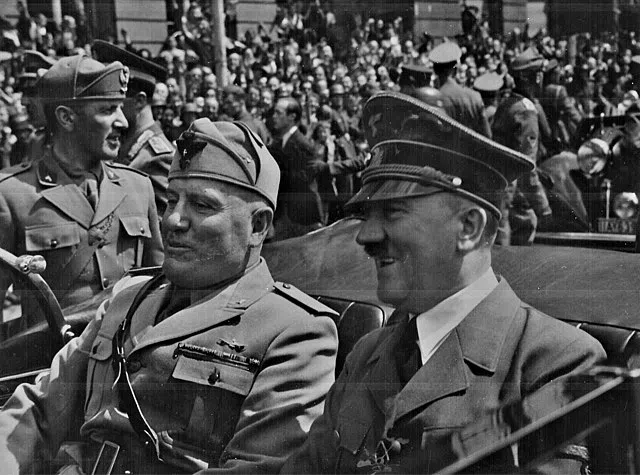
Fig. 4: Italian dictator Benito Mussolini and German dictator Adolf Hitler were allies and friends before fascism failed in Italy and the Italians shifted their alliance, declaring war on Germany.
The massacre of Italian soldiers in Cephalonia is also a historical event, called the massacre of the Acqui Division or the Cephalonia massacre. The German forces killed roughly 5,000 Italian soldiers outright, and 3,000 more died when the Allies sank their concentration camp-bound ship.
While historical events inspired the novel, de Bernières asserts that his characters are all works of fiction. Some scholars have claimed that Captain Corelli is based on artillery captain Amos Pampaloni, but de Bernières denies those claims. He has stated that the characters and the romance between them are works of his imagination.
Captain Corelli's Mandolin Analysis
Although conventionally beautiful and nurturing, Pelagia is somewhat of a social outcast because she doesn't fit society's expectations for a woman. Instead of being content as a stay-at-home mother and wife, Pelagia wants to become a doctor like her father and enter the male-dominated world of medicine. Her rejection of society's conventions is especially apparent in the symbolic image of her needlework.
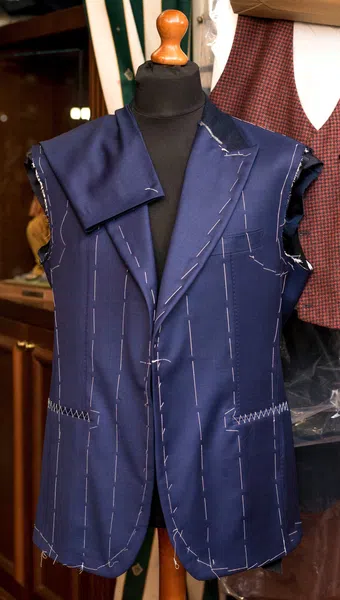
Fig. 5: Pelagia's needlework on the waistcoat she makes for Mandras is symbolic of her fears in marriage.
When she is engaged to Mandras, Pelagia resolves to crochet a waistcoat for him and a bedcover for their wedding bed. But she struggles with all forms of needlework because her mother died before she could teach Pelagia the female-coded craft. Pelagia gets particularly frustrated with the bedcover and destroys entire sections, redoing it over and over. Her inability to complete the bedcover for her union with Mandras reveals her struggle to give up her personal identity and settle into married life. Pelagia doesn't know how to be a wife because she never had a strong maternal figure in her life, and, like the bedcover, marriage seems elusive and unknowable to her.
The hand-embroidered waistcoat is symbolic of the vulnerability Pelagia fears in marriage. When Pelagia offers Mandras the coat she made him, he rebukes her work and insults Pelagia herself. He tells her it is hideous and not symmetrical, throwing Pelagia's insecurities in her face. Corelli, on the other hand, praises the waistcoat, telling Pelagia it is a masterpiece and that the imperfections make it even more beautiful. Whereas Mandras exploits Pelagia's insecurities, Corelli reframes her perceived shortcomings as a source of beauty and individuality.
Captain Corelli's Mandolin Themes
The main themes in Captain Corelli's Mandolin are the devastating effects of war, gender and opportunity, and love's ability to prevail.
The Devastating Effect of War
None of the characters are safe from the effects of World War II. Even before the Italians seize control of the island, the people of Cephalonia are weary from years of fighting and conquest. The war has caused social divisions to deepen, which drives the islanders apart from one another and causes infighting. Some islanders, like Mandras, join the war efforts and come back physically wounded and mentally changed. Mandras, who was once sweet and eager to make Pelagia happy, returns hardened, angry, and abusive.
The worst effects of the war happen when German troops come to the island and execute the Italian soldiers. The Italians, who had become friends with some of the islanders, are slaughtered. The people of Cephalonia watch as their home becomes the stage for public executions. The psychological effects of war are only worsened when the militant communists move in and send prominent members of the community to concentration camps. For those people and their families, including Dr. Iannis and Pelagia, life is never the same. The instability and disorder caused by World War II enabled radical groups to move in and completely devastate the state of life on Cephalonia—and around the world.
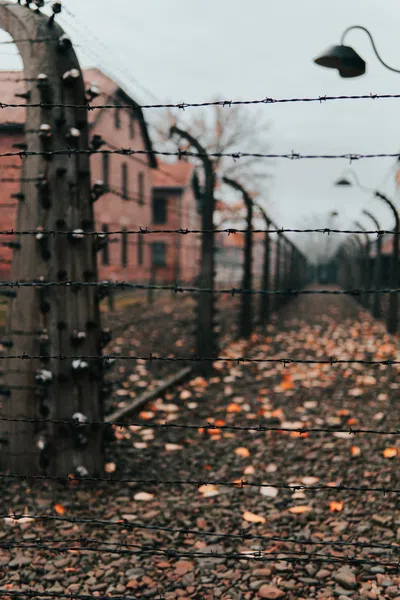
Fig. 6: Dr. Iannis is sent to a concentration camp for two years and returns a haunted, broken man.
Gender and Opportunity
The dichotomy between the two genders and their opportunities is most apparent in Pelagia's character. While she is expected to be a wife and homemaker, Pelagia's greatest desire is to become a doctor. While her father teaches her, society makes it much more difficult for her because she is a woman. She is accused of being a witch and is socially ostracized because she doesn't fit into traditionally feminine roles.
While her father had a relatively easy path to becoming a doctor and is a prominent member of the community, Pelagia had to carve out her own opportunities and fight for every ounce of power she had. Women throughout the novel are limited to the very specific spheres of housewife and homemaker, while men—like Dr. Iannis, Captain Corelli, and Mandras—are almost always the ones in power.
Love's Ability to Prevail
While it might seem counterintuitive, Pelagia's story also shows love's ability to prevail. She might not have had an epic romance with Captain Corelli, but she does find love in other places. In Corelli's absence, she becomes closer to Drosoula, and they develop a deep companionship and love for one another. Pelagia also adopts Antonia, who teaches her the love of motherhood.
While Pelagia never marries, love prevails in unexpected ways. At the end of the novel, Corelli returns after decades away. He reveals that he is still in love with her, and despite her anger, they are soon riding his motorcycle just as they did when they were younger. After spending almost a lifetime apart, they are brought back together and reunited in love.
Captain Corelli's Mandolin - Key Takeaways
- Captain Corelli's Mandolin was written by Louis de Bernières and published in 1994.
- It is a work of historical fiction, and de Bernières has stated that the characters are all fictional.
- The novel is set during the early years of World War II, as the Italians and later the Germans control the Greek island of Cephalonia.
- One of the most symbolic images in the novel is Pelagia's needlework, which highlights her struggle to fit into the traditional feminine role society has dictated for her.
- The main themes are the devastating effects of war, gender and opportunity, and love's ability to prevail.
Similar topics in English Literature
Related topics to American Literature
How we ensure our content is accurate and trustworthy?
At StudySmarter, we have created a learning platform that serves millions of students. Meet
the people who work hard to deliver fact based content as well as making sure it is verified.
Content Creation Process:
Lily Hulatt is a Digital Content Specialist with over three years of experience in content strategy and curriculum design. She gained her PhD in English Literature from Durham University in 2022, taught in Durham University’s English Studies Department, and has contributed to a number of publications. Lily specialises in English Literature, English Language, History, and Philosophy.
Get to know Lily
Content Quality Monitored by:
Gabriel Freitas is an AI Engineer with a solid experience in software development, machine learning algorithms, and generative AI, including large language models’ (LLMs) applications. Graduated in Electrical Engineering at the University of São Paulo, he is currently pursuing an MSc in Computer Engineering at the University of Campinas, specializing in machine learning topics. Gabriel has a strong background in software engineering and has worked on projects involving computer vision, embedded AI, and LLM applications.
Get to know Gabriel













